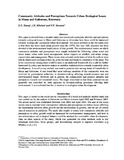Community attitudes and perceptions towards urban ecological issues in Maun and Gaborone, Botswana

View/
Date
2005Author
Toteng, E.N.
Mbaiwa, J.E.
Moswete, N.N.
Publisher
Botswana SocietyType
Published ArticleMetadata
Show full item recordAbstract
This paper is derived from a broader study that examined community attitudes and perceptions
towards ecological issues in Maun and Gaborone to determine how these could be harnessed
towards ecologically sustainable urban development. The major problem in the two study sites
is that there has been rapid urban growth since the 1970s, but very little attention has been devoted to the environmental implications of that growth. The environmental issues on which
community attitudes and perceptions were sought included the following: urban water and waste water; urban solid waste management; urban impacts on wildlife; and urban energy
conservation and management. These issues were selected on the basis of what the authors were
able to obtain socio-ecological data on, given the time and financial constraints of thestudy. The
urban ecosystems management model is used as an analytical framework that could be further
harnessed by policy and decision-makers to mobilize stakekeholders towards sustainable urban development. A social survey method was used to generate data among heads of households in Maun and Gaborone. It was found that most ordinary members of the community were not involved by government authorities in decision-making affecting natural resource use and
environmental issues. However and in general, the communities had positive attitudes and perceptions towards environmental issues. The major draw-back is that these communities are generally not consulted by state agencies in decision-making processes affecting their environment. It is concluded that this is inimical to ecological urban development.
Collections
- Research articles (ORI) [270]
